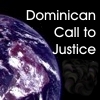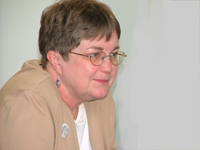 |
|---|
Toni Harris,
OP
1. What do you want Dominicans in the US to know about the justice work of the Order? I have only been in the office a few months, of course. However,
what has touched me most about the Order’s work for justice
is that, of the 35 countries in the world where 80 percent of the
population live on less that $2 a day, Dominicans are in about
20 of those countries. Of the 70 countries identified as actual
or potential areas of conflict, Dominicans are in about half of
them. It is very significant for me to grow in awareness
that Dominicans around the globe are working in areas of great
poverty and great conflict. 3. What are your top concerns for the work of justice
and peace in the Order? 4. That seems like a very tall order! Are you hopeful of making some inroads into meeting these challenges? It is important that Prakash and I – and all the Regional (continental) Co-Promoters, the congregational and the provincial Promoters -- work to keep these priorities before the world-wide Dominican Family. (Of course, these are inter-related issues.) Many Dominicans are working directly to address them. Additionally, it is essential for all Dominicans at the “grass-roots” level to reflect about the ways in which their lives and ministries relate to these global priorities. I believe that EVERY ministry undertaken may be understood as an opportunity to respond to one or more of these priorities. The old axiom, “Act locally; think globally.” is relevant here. With everyone’s effort, I believe that inroads are made. 5. Since January, when you started this new work, what
has surprised you? 6. What disappoints you? My greatest disappointment is in myself! I regret very much that I do not speak at least one other language. I am working hard to learn Spanish but it’s difficult to learn outside a Spanish-speaking environment. It is a disappointing reality that so many of us from the USA are not fluent in other languages. The sister who preceded me in this role – Marie Therese Perdriault OP (from France) – speaks four languages. 7. If you could ask every Dominican in the United States to do something to bring greater peace in the world, what would it be? There is a great challenge in just knowing the people who live
across the street from you. Do we know our immediate neighbors
well enough to talk to them and to know what’s going on in
their lives? 9. Does being an American in this role offer any particular challenge or caution, given the present attitude of the world toward the US? Yes, being a citizen of the country that is viewed with distrust
or outright animosity by most peoples of the world (without exaggerating)
is a challenge. Some people will not want to have anything
to do with me because I am a citizen of the US, others will give
me 10. If you could ask every Dominican in the US to read one book, what would it be and why? Following Jesus in a Consumer Society, by James Kavanugh, SJ. The book is several years old, but it is the most challenging book I’ve read – it challenges our US lifestyle in light of what the Gospel requires. Thanks, Toni. It has been a pleasure visiting you.
|


